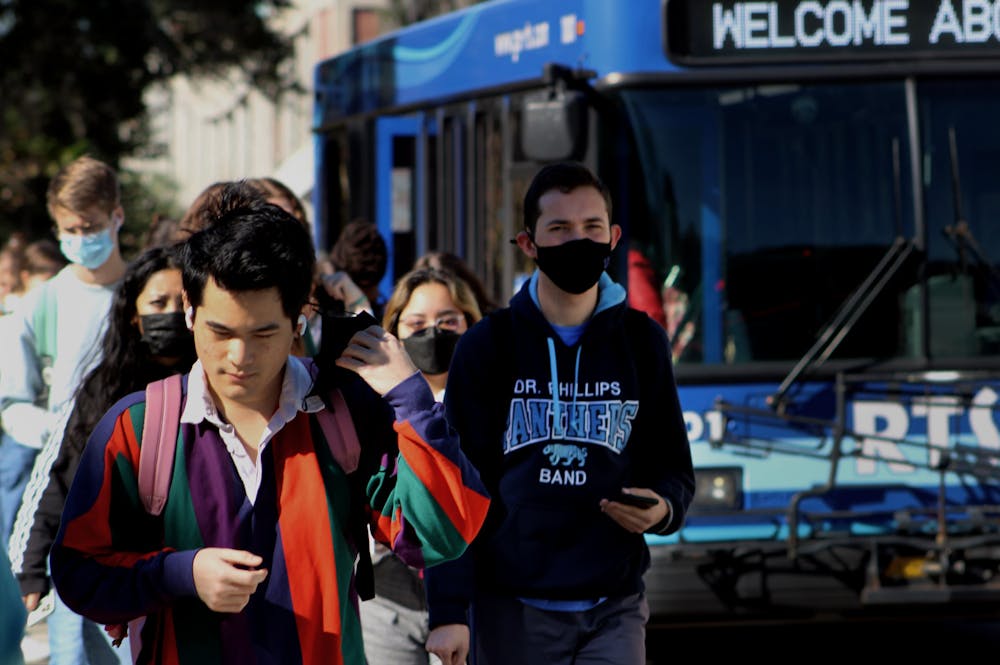Whether she’s making the trek to class from her off-campus apartment or navigating Alachua County’s social scene, Shelby Stott has always found Gainesville’s Regional Transit System to be vital in her everyday commute.
When the university proposed drastic funding cuts in April impacting both on- and off-campus bus routes, the 21-year-old UF anthropology senior said she was scared.
“RTS gives them [UF] a really fair deal for these buses, and I think that students need them,” she said. “Campus is 2,000 acres or something. Who is going to walk 2,000 acres in a day to get from class to class? That's a ridiculous expectation in 100-degree heat.”
Following community controversy over RTS funding cuts, the system’s most recent monetary contributions did not come from the university but instead came in the form of a $24.6 million grant from the Federal Transit Administration as a part of the Biden-Harris administration’s Bipartisan Infrastructure Law.
Announced July 9, 47 states received grants toward sustainable infrastructure development amounting to $1.5 billion, with nearly $5 billion in total funding distributed since 2021.
“Much of the award … will enable the City to purchase full-sized hybrid electric buses. The remaining funding … will be used to build the City’s first solar-generating facility at the RTS administration complex,” according to a July 10 City of Gainesville news release.
However, the grant is unable to be allocated toward bus operations or maintenance, leaving on- and off-campus routes imperiled. The City of Gainesville reached an agreement with UF in May stipulating that the university continue to provide their current fiscal contribution until 2025, which currently totals to $14 million to keep RTS running normally until a new budget is discussed for next year.
Mayor Harvey Ward said the state grant was awarded specifically for the purpose of greener public transportation and may not be used beyond helping the city reach its goal of zero carbon emissions by 2045.
“We'll be eliminating from our fleet 15 to 20 diesel buses and replacing them with either electric or hybrid buses that directly impacts the city's carbon emissions,” he said. “It makes the city of Gainesville’s air better, but overall, it lowers the amount of the carbon load that we as a community put on the earth.”
The new buses could arrive as early as 2026, and RTS will prioritize the replacement of existing diesel buses based on age and mileage.
For students like Stott who rely on public transit, a more sustainable RTS is “cool,” but she said it doesn’t solve the greater issue of canceled routes due to insufficient operating budgets moving into 2025.
“Our county is not walkable at all … you have to have some sort of transportation to get people from point A to point B if you're going to have such a traffic reliant kind of city,” she said.
The federal funds would more effectively protect energy-efficient infrastructure if they could be used to ensure the continuation of city-wide public transit, which Stott said is automatically more sustainable than allowing widely -used routes to close.
Part of the Biden-Harris administration’s Bipartisan Infrastructure Law, the grant aims to achieve zero emissions by 2025 nationwide.
While Sandra Ukah, a 19-year-old UF political science sophomore, expressed support for allocating federal funds toward climate-conscious transportation, she said it may not matter if UF discontinues their RTS monetary commitment in 2025.
“I think that having a bunch of accessible routes for students is just as important as having the system itself,” she said. “The win can't just be having the [new] buses, we need to make sure that they're able to be used by students that really, really need them, too.”
Ward said UF and the City of Gainesville have held meetings on “an almost weekly basis, doing a very intentional deep dive into how this moves forward.” Regardless of threats to current bus routes, he expressed support for turning to renewable energy.
“This funding will truly help us better serve our neighbors who rely on RTS for safe, efficient and reliable transportation every single day,” he said in a July 10 news release.
Contact Morgan Vanderlaan at mvanderlaan@alligator.org. Follow her on X @morgvande.
Morgan Vanderlaan is a second year political science major and a Spring 2025 metro general assignment reporter. She has previously worked on the enterprise desk as a political reporter and on the county and city commission beat. When she's not on the clock she can be found writing, reciting and watching theatre!






